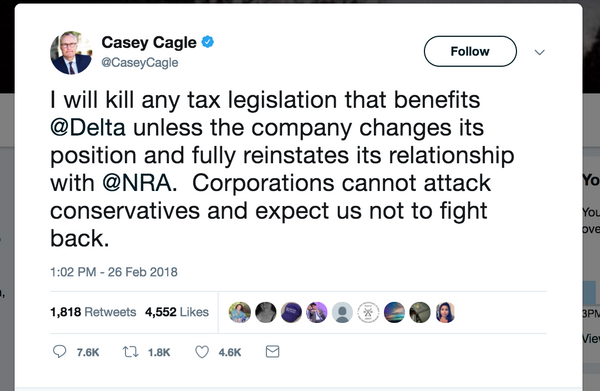FedEx CEO Fred Smith’s overheated response to a New York Times story about its tax bill – or lack of it – offers a PR master class in how not to react to an investigative piece.
The NYT story packs a punch. By taking advantage of the 2017 tax legislation that cuts corporate rates from 35 to 21 percent, FedEx managed to reduce its tax bill from $1.5 billion that year to exactly zero in 2018. That’s right, zero. All perfectly legal, of course. The piece illustrates how many major corporations benefited from the tax cuts and what some did with the windfall, using FedEx as an example.
FedEx is a logical company to carry the broader story in part because Smith lobbied heavily for tax reform, flogging it conversations with Treasury Secretary Steven Mnuchin, in op/eds and in media interviews as a way to stimulate capital investment by companies like his. He even floated the tax bill as a way for companies to offer higher wages to its workers.
Yet the article reports that, like many other corporations, FedEx invested primarily in buying back its own stock rather than in capital expenditures or even wage increases. It mentions previously scheduled pay raises for some employees and modest capital investment in 2018 but notes that FedEx actually reduced capital spending by $240 million after the tax policy changed.
The point is simply that the tax bill probably isn’t working as intended, or at least as promoted. It’s far from the first article to point this out, but the FedEx example gives a lot of weight to the story.
FedEx may get it done for customers but its own message delivery has fallen short. When the story hit, it fired back quickly with a letter from CEO Smith. The response is a study in protesting both way too much and far too little. It’s over-the-top on anger and accusation but empty of substance or facts. In an almost Trumpian display of whataboutism, Smith calls the story an “outrageous distortion of the truth,” then slams the New York Times company for its own “zero” federal income tax bill and reduced capital investment. Smith signs off by challenging the newspaper to a debate about tax policy along with his vice president for tax.
In short, as a corporate communications response, it’s reactive, defensive, and needlessly combative. Here are a few ways FedEx could have handled things differently in order to support its reputation and offer relevant information to the public.
Point out any inaccuracies
As we counsel clients, no journalist wants to get facts wrong and most will correct any errors. The thing to do is to point out wrong or misleading information respectfully and promptly. But here, despite calling the story “an outrageous distortion” and “inaccurate,” the letter never challenges a single fact. That makes FedEx look defensive and even hypocritical. And the surest way to pick a fight you probably don’t need is to cry foul on facts when the truth is you don’t like the coverage.
Acknowledge what’s true
FedEx is hardly alone in taking advantage of the tax cuts. Though the tax reform bill has been controversial, it was welcomed by many business leaders and it did offer a boost to the economy, or at least to the stock market. It would have been smarter to acknowledge FedEx’s duty to its shareholders to reap all possible benefits from the legislation, which Smith championed openly. Most of it is public information anyway.
Fill in the blanks
What about future plans? What did the piece leave out? Only one full tax year has passed since the bill went into effect. It’s highly possible that FedEx intends to spend on capital investment in the future. And wage increases may have been limited by the economic slowdown abroad. Maybe some aspects of the company’s position on tax policy were left out of the piece. If so, this is a golden opportunity to shine a light on future plans. Instead of seizing it, Smith squandered the opportunity with a juvenile-sounding challenge.
Lead the discussion
Smith calls for a debate focused on “federal tax policy and the relative societal benefits of business investments and the enormous intended benefits to the United States economy, especially lower and middle class wage earners.” This is actually a fine idea. Smith was an open champion of tax reform and he should be able to defend it as well as identify areas for improvement. The problem is that he sets up the discussion as a kind of boxing match where his company goes one-on-one with a national newspaper, as if they are equivalent businesses with parallel roles in the dialogue. Not only is that asymmetrical, but it’s needlessly antagonistic.
Stay calm and civil
The hyper-defensive tone of the response suggests that FedEx is ashamed of its actions. And hurling similar accusations at the Times about its own tax payments is not only an obvious deflection, but could be construed as a tacit admission that both companies are bad actors. It certainly doesn’t help clarify the situation or enlighten anyone on what FedEx might be doing right, or what it plans in the future. Public examples aside, staying calm in response to unflattering coverage is a sign of strength, not weakness.



